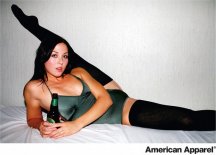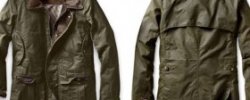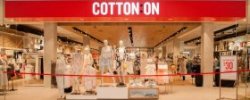The fast-fashion merchant has made still another questionable decision, releasing an innovative new advertisement that transforms edgy into just plain distasteful.
“[Maks] is a merchandiser who has been with American Apparel since 2010. Created in Dhaka, the capitol of Bangladesh, Maks clearly recalls attending mosque as a young child alongside the woman traditional Muslim parents. At age four, her household made a life changing go on to Marina Del Rey, California. Although she unexpectedly discovered by herself a world from Dhaka, she proceeded following the woman mother or father's spiritual traditions and suffered her Islamic trust throughout the woman childhood. Upon entering high-school, Maks begun to wish to create her own identity and finally distanced herself from Islamic customs. A female continually looking for brand new creative outlets, Maks unreservedly embraced this photo shoot.
She's got found some aspects of Southern California tradition is straight away appealing, it is trying to explore what lies beyond the town's trivial pleasures. She doesn't feel the need to determine by herself as an American or a Bengali and is maybe not content to suit the woman life into others's standard narrative. That is what tends to make the girl essential to the mosaic this is certainly Los Angeles, and unequivocally, a distinct figure inside ever-expanding American Apparel family. Maks had been photographed in Tall Waist Jean, a garment manufactured by 23 skilled American employees in Downtown La, all of who are compensated a reasonable wage and have use of basic advantages like health care.”
Yes, the statement are a playful nod within model’s history, but it also targets among fast-fashion industry’s biggest issues: sweatshops and their particular unsafe doing work conditions. In April 2013, Bangladesh-based apparel factories made intercontinental headlines as soon as the Rana Plaza Building, which produced clothing the likes of JC Penney and Mango, collapsed, causing over 1, 000 deaths.
Following tragedy, American Apparel CEO Dov Charney spoke completely against international, sweatshop manufacturing. "In Bangladesh, the issue by using these industrial facilities is that they’re just provided agreements on a seasonal or order-by-order foundation, " Charney informed the L.A. days. "There’s so much force to execute, a few of the working problems are crazy, nearly unbelievable. This has completely stripped the person factor from the companies… It’s these types of a blind, desensitized way of making garments."
In 2002 United states Apparel dubbed it self “sweatshop-free, ” priding itself on producing pieces in Downtown L.A., without outsourcing international like a great many other fast-fashion companies. The brand name additionally cites on its website that its “garment workers are paid up to 50 times over the competition” (i.e. Bangladesh perspiration stores). “i believe these merchants require their asses handed to them, ” Charney said associated with businesses which outsource to unsafe production facilities.
Whether or not Charney is deliberately attempting to simply take a jab at bad doing work conditions in the area, it really is challenging see the brand-new promotion as such a thing except that another regarding the company’s misguided moves. An from might 2013 accordingly emphasized the business’s “Made in the USA” mindset in light regarding the circumstance overseas. With dangerous problems still influencing factory employees in Bangladesh, Charney deserves applause for their dedication to socially-responsible makers. But, making use of a topless, Bangladeshi design to market the reason? Which will not be the essential stylish path.







